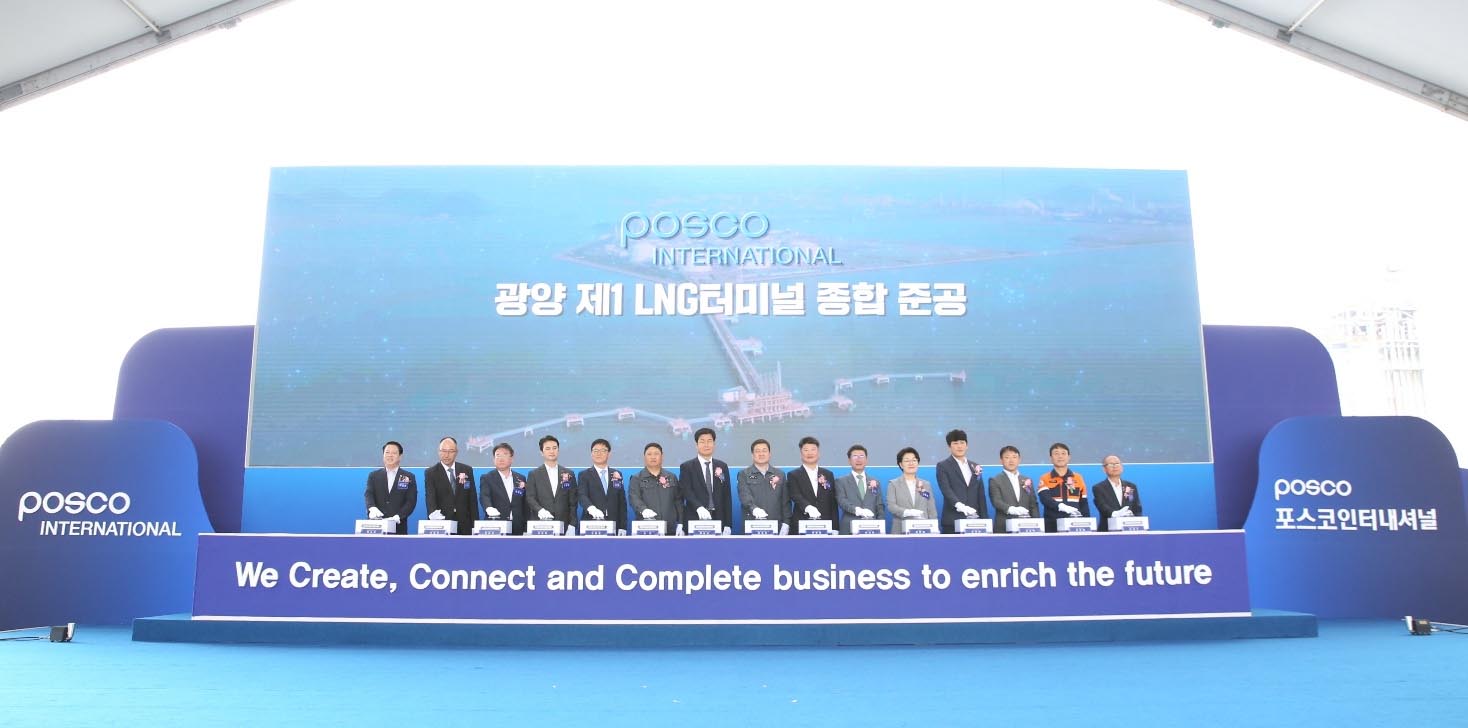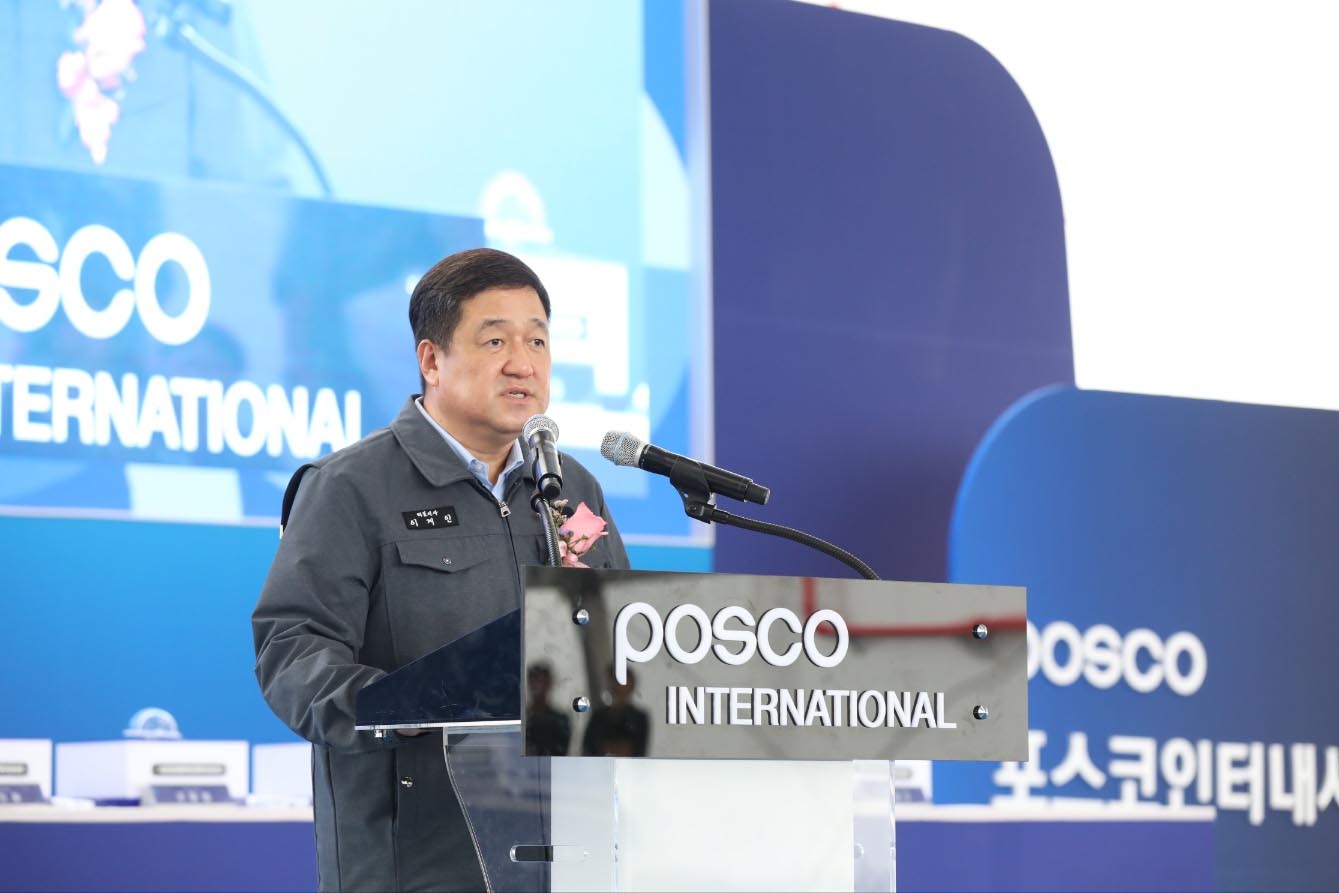Invested KRW 1.45 trillion over approximately 20 years, now securing 930 thousand ㎘ of storage capacity
Supplying natural gas for power generation and manufacturing, with services including unloading, storing, regasification, and discharging
Commencing complementary businesses, such as sea trial and bunkering for ships, to establish a foundation for the blue hydrogen project
POSCO INTERNATIONAL completed the full construction of Gwangyang LNG Terminal 1 (hereinafter referred to as Gwangyang Terminal 1) on the 9th of July. Launched in 2002, this extensive infrastructure construction project received investments amounting to KRW 1.45 trillion over approximately 20 years.

More than 100 personnels from the government and client companies attended the completion ceremony to add to the occasion, including Choi Nam-Ho, the Second Vice Minister of the Ministry of Trade; Park Chang-Hwan, the Vice Governor of South Jeolla Province; Jung In-Hwa, the Mayor of Gwangyang; Kwon Hyang-Yeop, the National Assemblyman; Choo Hyung-Wook, the President of SK E&S; Lee Sang-Kyun, the President of Hyundai Heavy Industries; Kim Hwan-Yong, the Vice President of Korea Gas Corporation; and POSCO Group executives including Lee Kye-In, POSCO INTERNATIONAL CEO.

POSCO INTERNATIONAL, a specialized corporation leading Korea’s energy industry with its comprehensive LNG value chain that includes exploration, production, storage, and power generation, initiated this project to secure stable infrastructure assets for LNG storage.
As a result of the completed construction, Gwangyang Terminal 1 now boasts a storage capacity of 930K ㎘ across the Storage Tanks No.1 to 6, as well as port facilities of about 180K m³.
Gwangyang Terminal 1 not only provides natural gas for power generation and manufacturing in Korea’s key industries, but also offers comprehensive services for unloading, storing, regasifying, and discharging natural gas directly imported by client companies such as POSCO, S-OIL, and SK E&S.
It is worth noting that Storage Tanks No.5 and 6 are the first in Korea to use *cryogenic high-manganese steel that POSCO invented for the first time in the world. Moreover, during the construction project to enhance the soft ground of the landfill at Gwangyang Bay, the compaction pile method was newly applied using steel byproduct for the additional benefit of reducing the usage of natural aggregates.
*Cryogenic manganese steel is characterized by its excellent impact toughness and solidity under extreme environments of -162℃ or below, the temperature required to keep LNG liquefied.
Also, the construction project for Gwangyang LNG Terminal 2, which will add two 200K ㎘ LNG tanks at a nearby site, has received an investment of KRW 930 billion and is currently progressing through streamlined construction processes.
POSCO INTERNATIONAL will secure a total of 1.33M ㎘ of LNG storage capacity by 2026, with the completion of Gwangyang LNG Terminal 2. This amounts to 40 days’ worth of heating gas for the entire population of Korea.
Securing such a large amount of LNG storage capacity also enhances national energy security. This is due to the recent trend among advanced countries in the world to focus on securing energy demand sources and domestic infrastructure for storage in response to the energy supply chain crisis and increased demand for LNG.
In its future endeavors, the company plans to further strengthen the midstream sector (liquefaction, transportation, storage, and trading) corresponding to the middle part of the LNG value chain with Gwangyang Terminal playing a pivotal role.
In addition to the current LNG storage tank rental business, there are plans to develop complementary projects such as sea trial and bunkering of LNG carriers. These endeavors aim to bolster both domestic and international industries while laying the groundwork for advancing the blue hydrogen project in the future.
“Gwangyang LNG Terminal 1, which marked the inaugural commercial operation by a private company in Korea in 2005, has contributed to the nation’s economic growth and energy security,” remarked Choi Nam-Ho, the Second Vice Minister of the Ministry of Trade during the completion ceremony. “In light of escalating uncertainties in international energy supply and demand, we are committed to leveraging all available measures to mitigate industry impacts.”

“I’m deeply grateful to the executives, employees, and on-site laborers for creating a safe workplace without a single major incident since the commencement of terminal construction initiated in 2002,” said Lee Kye-In, POSCO INTERNATIONAL CEO. “In the future, we aim to ensure a stable supply of domestic energy and enhance our competitiveness in the global energy market through digital transformation initiatives that automate and optimize the operational management of Gwangyang LNG Terminals.”
